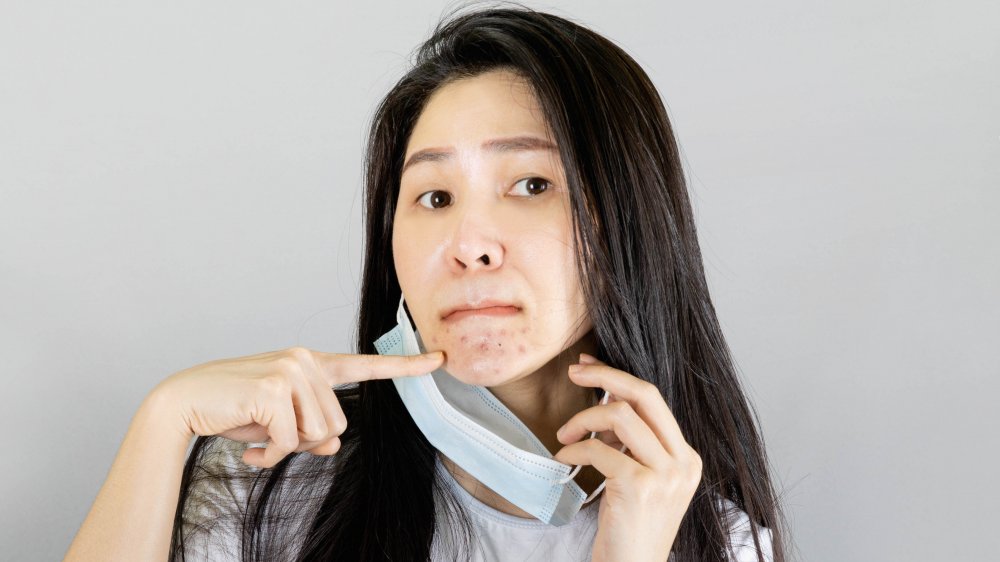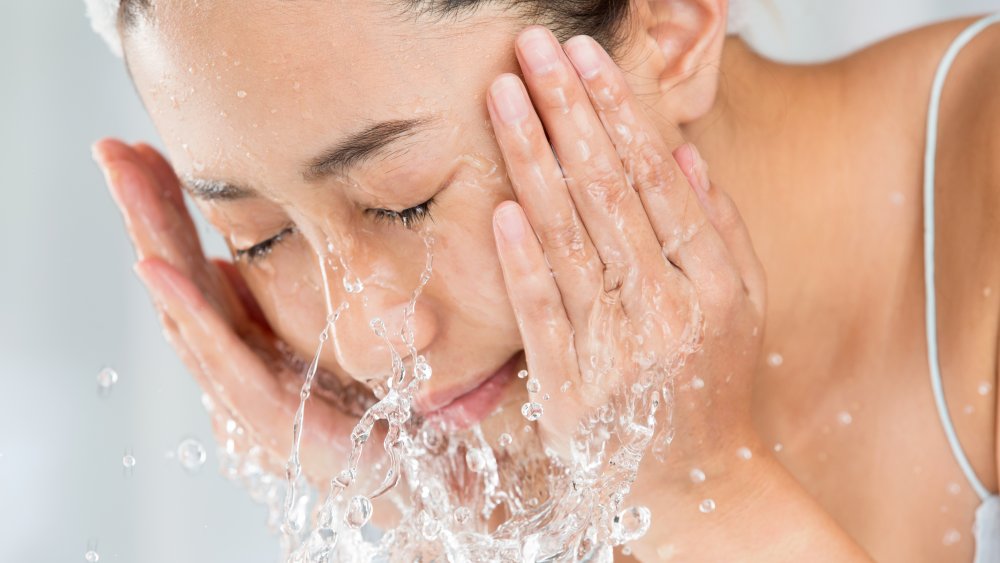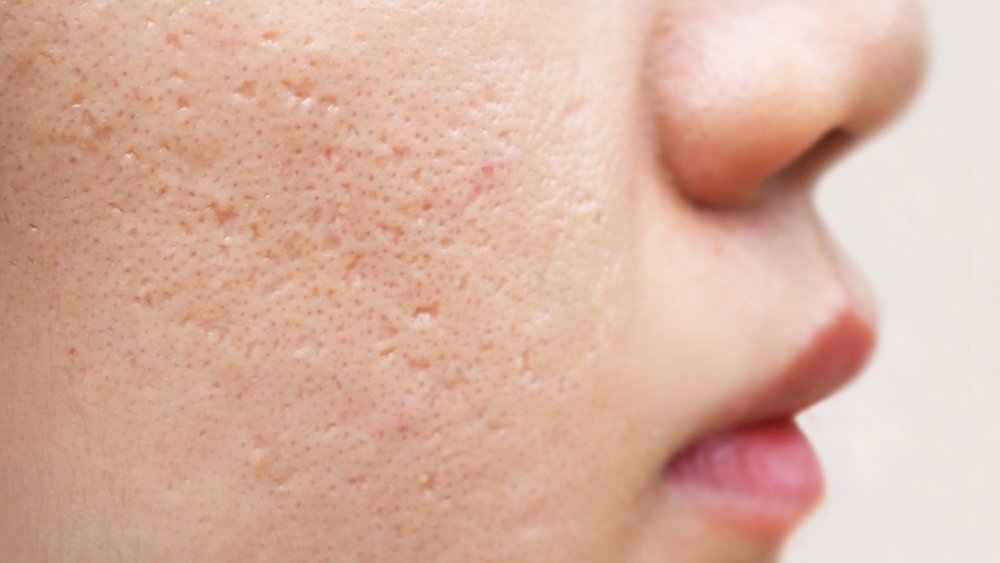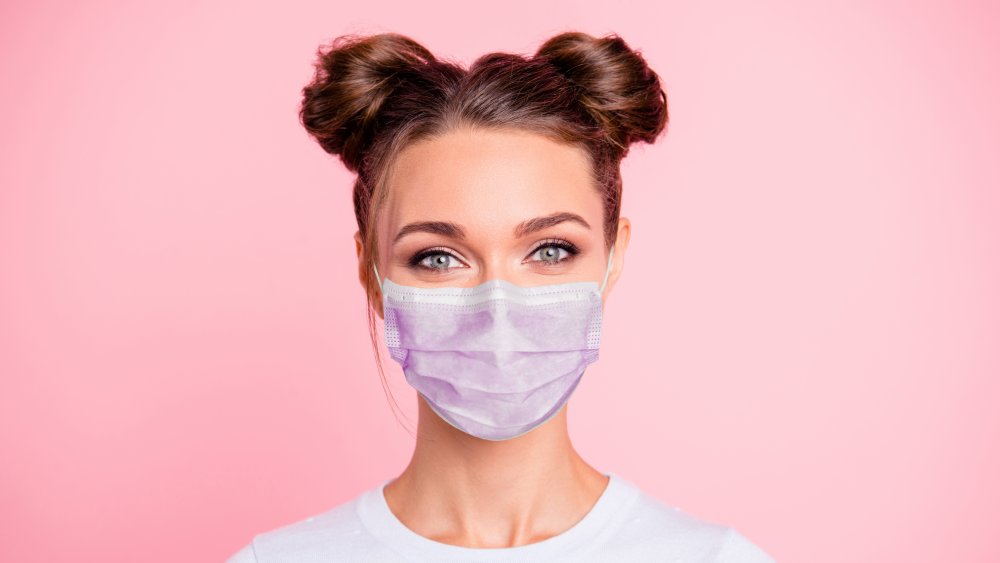Dermatologist Explains How To Tackle Your 'Maskne'
By now face masks are as much a part of our "can't leave home without" equipment as purses, wallets, or car keys. Whether mandated or not, the main reason to wear them is — we can't repeat this too often — they protect other people from your germs. Make all the poor decisions you want, as long as you're the only one affected. After all, nobody suffers but you if you scarf down an entire pint of ice cream (and your good friends Ben & Jerry will thank you all the way to the bank), but when it comes to a worldwide pandemic, everyone shares germs, unless we keep on wearing masks.
Sure, there are downsides to masks, such as making your face sweat and fogging up your glasses, but these are a small price to pay for keeping everyone healthy. There's one side effect of mask-wearing, though, that's just the worst: the dreaded "maskne." Yuck. We'd do anything to avoid it, short of going maskless, since... you know. But how? Sure, TikTok's full of tips and tricks, but DIY acne treatments tend to be pretty dubious, and some, such as the one for curing acne with aspirin, are more like "don't-be-us."
If you want skincare tips that will be both safe and effective, who you gonna call? A medical professional like Dr. Susan Massick, a dermatologist at The Ohio State University Wexner Medical Center, who shared with us these maskne-beating tips.
How to avoid getting maskne
Dr. Massick says that the best way to deal with maskne is, of course, not to get it in the first place, and says to start out each day with just the simplest of skin care routines. She recommends using a light moisturizer with sunscreen but advises skipping the makeup. Well, this last statement she clarifies a bit further, saying "mascara, eyeliners, and eye shadows are fine to use," but insisting you "avoid heavy moisturizing creams and foundations, which will lead to clogged pores, and lipstick, which will just rub off onto the masks."
She also says to keep your hands off your face, and especially away from your nose and mouth, pointing out that "people touch their faces constantly without even realizing it." Her specific advice related to mask-wearing involves wearing a clean one every day and having a backup on hand at all times in case the one you're wearing gets too dirty. She also suggests washing your face as soon as you get home and de-mask as well as taking periodic mask-breaks throughout the day as long as you are alone and it's safe to do so.
What to do if you've already got maskne
If it's too late for prevention and your face is breaking out like you're 16 years old and it's the night before your junior prom, Dr. Massick can help with this, too. She says if your skin is feeling oily, you should use a medicated cleanser with salicylic acid, sulphur, or sodium sulfacetamide, or maybe benzoyl peroxide if your skin is really greasy. She also suggests using leave-on gels meant to decrease oil production (their active ingredients are likely to be differin or benzoyl peroxide), but says, "Beware because these products can cause dryness." She also says that toner is only necessary if your skin has a significant pH imbalance, so in most cases, it's really not all that essential.
If your breakouts and/or oily skin seems to be worsening, Massick says you can add in a salicylic acid or benzoyl peroxide wash at night or, should breakouts become severe, apply benzoyl peroxide cream to your zittiest bits. If none of these methods seems to be working, though, she says you may need to book an appointment with a board-certified dermatologist to see about prescription-strength topical meds. She even warns that there's a slight chance you could develop perioral dermatitis due to mask-wearing, in which case you'd need oral antibiotics.
The types of masks most likely to cause maskne
If you're wondering whether certain types of masks are more likely to cause maskne, it seems that this is, in fact, the case. While masks need to be made from fabric dense enough to filter germs, Massick says that unfortunately, "The consequence of thicker/denser fabrics, is that when you breathe, moisture and humidity get trapped under the mask." This leads to increased sweat and oil production, which in turn leads to skin breakouts. She does say certain types of mask materials can feel more irritating to the skin, and advises choosing "masks made with soft, non-abrasive material, with a tight-weave that is breathable, and with multiple layers." She adds that natural fibers like cotton will usually be a better option than synthetics.
While you probably can't "try before you buy" when it comes to masks, you can and should start by just buying a single mask when experimenting with a different brand or style so you can judge how it feels on your face before committing to purchasing more of the same. Massick says when choosing a mask, you should look for one where the material doesn't feel rough or abrasive or cause your face to itch when you wear it. After all, a mask that's uncomfortable is not only going to be more likely to trigger skin problems such as maskne, but will also be a mask you'll be less likely to wear, and that isn't safe for anyone.




